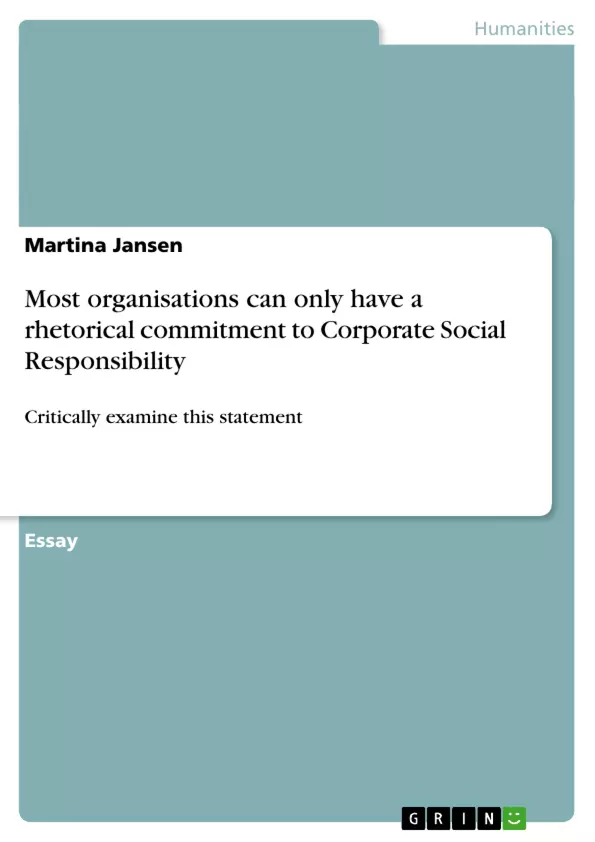"[I]t remains a fact that many business leaders still only pay lip service to CSR, or are merely reacting to peer pressure by introducing it into their organisations. A smaller number have an inherent sense that it is ‘the right thing to do’ and feel committed to it. Fewer still are convinced about the business benefits and have embedded it throughout their organisations" (Bevan et al. 2004:4)
To shed light on the hypothesis that most organisations can only have a rhetorical commitment to Corporate Social Responsibility (CSR) and hence to further explore the above citation is the aim of this essay. In order to do so, the analysis is organized in three chapters: Firstly, three different, alternative perspectives on organizations' responsibilities in general are examined, concluding that there is potential divergence on whether social aspects have to be considered as key elements for organizations. Secondly, the essay argues that some perspectives potentially conflict with the steep increase of CSR popularity during the past decades and defines real and rhetoric CSR commitment accordingly. Thirdly, rhetoric CSR as a gap between communication and implementation of CSR is decomposed into fixed and variable (economic cycle dependent) effects. The essay concludes with verifying the initial hypothesis especially for periods of economic downturns and emphasising the importance of further empirical research to better measure and fully grasp the implications of CSR nowadays.
Inhaltsverzeichnis (Table of Contents)
- Introduction
- I. Three Main Perspectives on Organisations' Responsibilities
- The shareholder perspective
- The stakeholder perspective
- The society perspective
- II. CSR in organisations: Rhetorical or real commitment
- Drivers of CSR popularity
- Real versus rhetoric CSR
- III. Explanation of gap between communication and Implementation of CSR
- Lack of capital/investment
- Lack of external punishment/pressure
- Conclusion
Zielsetzung und Themenschwerpunkte (Objectives and Key Themes)
The aim of this essay is to critically examine the statement that most organizations can only have a rhetorical commitment to Corporate Social Responsibility (CSR). This analysis explores the various perspectives on organizational responsibilities, analyzes the drivers and nature of CSR commitment, and investigates the gap between communication and implementation of CSR.
- The different perspectives on organizational responsibilities, including shareholder, stakeholder, and society perspectives.
- The distinction between real and rhetorical CSR commitment.
- The factors contributing to the gap between CSR communication and implementation, such as lack of capital and external pressure.
- The impact of economic downturns on CSR commitment.
- The importance of further empirical research to understand the implications of CSR.
Zusammenfassung der Kapitel (Chapter Summaries)
The first chapter examines three different perspectives on organizations' responsibilities: the shareholder perspective, the stakeholder perspective, and the society perspective. It argues that these perspectives offer varying views on whether social aspects should be considered integral to organizational goals.
The second chapter delves into the drivers of CSR popularity and differentiates between real and rhetorical CSR commitment. This analysis highlights the potential conflict between certain perspectives and the increasing popularity of CSR in recent decades.
The third chapter investigates the gap between communication and implementation of CSR, attributing it to factors like lack of capital and external pressure. It explores the fixed and variable (economic cycle dependent) effects on this gap.
Schlüsselwörter (Keywords)
The core concepts of this work revolve around Corporate Social Responsibility (CSR), organizational responsibilities, stakeholder theory, shareholder perspective, societal expectations, rhetoric versus real commitment, economic impact, and empirical research.
Frequently Asked Questions
What is "rhetorical commitment" to CSR?
It refers to companies only paying lip service to Corporate Social Responsibility or reacting to peer pressure without truly embedding it in their organizational culture.
How do shareholder and stakeholder perspectives on CSR differ?
The shareholder perspective focuses on profit maximization, while the stakeholder perspective includes the interests of employees, customers, and society in organizational goals.
Why is there a gap between CSR communication and implementation?
The gap is often caused by a lack of capital for investment or a lack of external punishment and pressure to follow through on social commitments.
Does the economic cycle affect CSR commitment?
Yes, the essay suggests that CSR commitment often becomes more "rhetorical" during periods of economic downturn when budgets are tighter.
What are the main drivers of CSR popularity?
Drivers include increasing societal expectations, consumer demand for ethical products, and the need for companies to maintain a positive public image.
- Quote paper
- Martina Jansen (Author), 2009, Most organisations can only have a rhetorical commitment to Corporate Social Responsibility, Munich, GRIN Verlag, https://www.grin.com/document/129867



